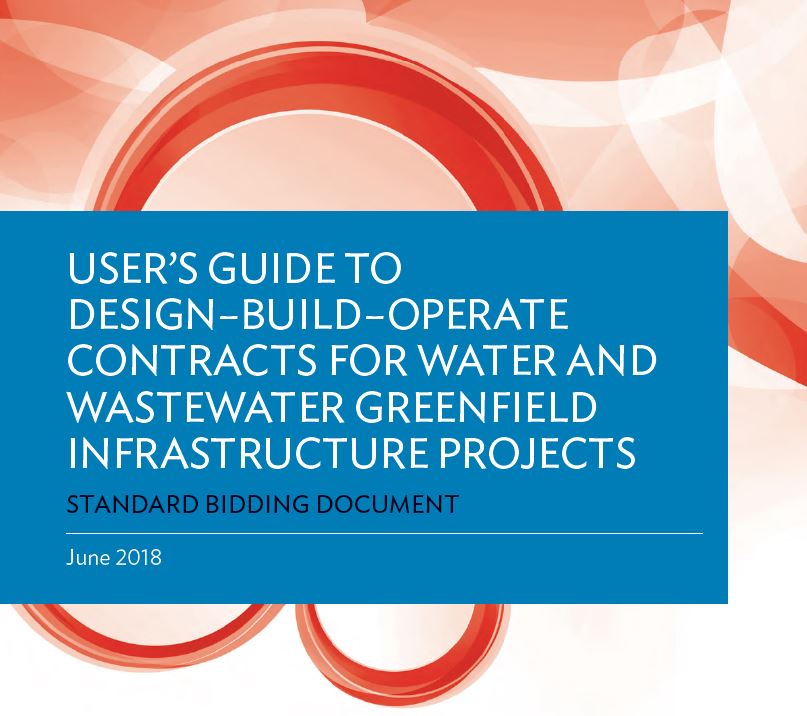Procurement Regulations for IPF Borrowers: User’s Guide to Design, Build, Operate Contracts for Water and Wastewater Greenfield Infrastructure Projects
The purpose of this user’s guide is to guide Employers on how to prepare a Bidding Document and conduct a bidding process based on the Standard Bidding Document of the Asian Development Bank (ADB) for the Procurement of Design–Build–Operate (DBO) Contracts for Water and Wastewater Greenfield Infrastructure Projects (SBD DBO W/WW). This guide should be read in conjunction with the relevant Guidance Notes on Procurement published by ADB. This user’s guide covers the SBD DBO W/WW using a “Single-Stage: Two-Envelope” or a “Two-Stage” Bidding Procedure. The envelopes are opened in public at the date and time advised in the Bidding Document. The bids are evaluated, and following approval by ADB, the Contract is awarded to the Bidder whose Bid has been determined to be the lowest evaluated substantially responsive Bid. The SBD DBO W/WW documents are available only in electronic format. They must be used for the procurement of DBO Contracts in relation with water and wastewater greenfield infrastructure projects, financed in whole or in part by ADB, unless ADB agrees to the use of other forms of bidding documents acceptable to ADB. The SBD DBO W/WW documents are intended to be used for the procurement of DBO Contracts through open competitive bidding when • the contract involves the design, build, and operation of water and/or wastewater greenfield infrastructure; and • the Employer wants the plant to meet the purpose of and to reach the performance standards defined under the Contract, and to have a Contractor contractually committed to deliver and operate a fit for purpose facility under a long-term performance-based contractual arrangement where the Employer’s primary concern lies with the achievement of performance objectives by the Contractor. The SBD DBO W/WW anticipates that the Contractor is acting as single point of responsibility for the overall design, build, and operation of the facility, over part of or all of the expected life span of the facility, including all necessary asset replacement during the so-called Operation Service Period. The procedures and practices incorporated in the SBD DBO W/WW have been developed through best international practices in this emerging arena (versus more traditional forms of contracting such as build-only, design–build, build–operate–transfer [BOT], or concessions) of DBO Contracts in the water sector, with whole life cycle costs and performance requirements being at the root of such contractual arrangements. Relevant Bid evaluation mechanisms and contractual machinery have accordingly been developed. The General Conditions of Contract are based on the FIDIC Conditions of Contract for Design, Build and Operate Projects, 2008 (1st edition) also known as the “Gold Book.” It assumes a greenfield environment, and an Operation Service Period of around 20 years. Shorter Operation Service Periods can nevertheless be considered, as further explained in this SBD, but the attention of the users is brought to the fact that one of the key strengths of the Gold Book, besides performance obligations, lies with the obligation of the Contractor to provide for all necessary asset replacement during the Operation Service Period, for a price preset in the Contract—through the Asset Replacement Fund and Schedule. This requires the Contractor to optimize design, construction, and operation activities to deliver assets, the actual life span of which is optimized, since any early asset breakdown would be at the Contractor’s risk and cost. Overly short Operation Service Periods will deprive an Employer of the benefit of this mechanism, if the Operation Service Period is shorter than the life span expectancy of the majority of the electrical and mechanical equipment. In such case, the Contract may come to an end before it can be fully demonstrated whether the assets delivered by the Contractor are robust enough to withstand the passing of time and operation. The Employer’s Representative is appointed by the Employer to supervise and manage the Contract on behalf of the Employer, to contribute to the successful completion of the Contract. When appointing the Employer’s Representative, the Employer may either select a reputable firm of consulting engineers experienced in the particular field, or appoint its own staff, if ADB is satisfied that the Employer has suitable in-house expertise. The document foresees the nomination of a Dispute Adjudication Board whose role is to prevent and promptly resolve disputes which may occur in between the parties to the Contract. The costs of the Dispute Board are shared equally by both parties. Arbitration is resorted to only if the parties fail to settle a dispute through the Dispute Board. The document also foresees the mobilization of an Auditing Body, being an independent and impartial body in between the parties, the primary role of which is to verify the parties’ compliance with their obligations during the Operation Service Period. This guide includes preliminary sections on • the key features of a DBO Contract, • the DBO project typology and risk matrix for Water and Wastewater infrastructure, • the Bidding Process and the way to conduct Bid evaluation, and • the Invitation for Bids.
